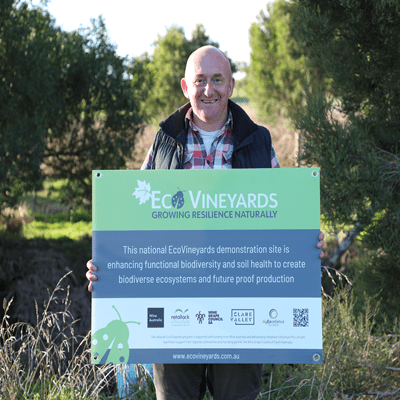Tell us in a few sentences about your experience as a viticulturist, how did you arrive here?
After arriving in Australia from Scotland in 2006, it didn’t take long for my wife and I to develop a keen interest in the wine industry and our beautiful, South Australian wine regions. Not knowing many people in Adelaide, we spent our first Christmas in the Clare Valley and our love for the region grew from there. In 2018 I stepped away from an IT career and bought 16 acres in Leasingham, Clare Valley, which included a little over 3 acres of established vines. The vineyard was in relatively poor condition and required a lot of maintenance. With lots of support from family, mentoring and advice from local growers and some private study the vineyard has now been revitalised, improving yield & quality and a further 7 acres has been planted.
The vineyard is now affectionately known to friends and family as “Blocks Road” and the business, “Braeside Vineyards”, is gearing up to be a part of the Clare Valley for many years to come. In terms of viticulture experience, I jokingly describe myself as a “trainee apprentice”. With the ever-changing environment we grow grapes in, it’s hard to imagine a time when I’ll feel like I completely know what I’m doing but every season I’m feeling more comfortable and capable.
Why did you decide to apply to be an EcoGrower, was there something specific that influenced your decision and/or had you attended a previous EcoVineyards session?
Since the initial Clare Valley EcoVineyards session in 2021 I’ve attended most events and followed the progress of our local EcoGrowers. While the plan for the vineyard has been fluid, the goal has always remained to improve the health of the land the vineyard sits on in a way that’s sympathetic to the ecosystem in and around it. That consideration of ecosystem, from plant habitat to insects to birds and bats, is one of the key themes of the EcoVineyards program that led to applying to be an EcoGrower.
Has there been a defining moment or catalyst for you to move towards more ecologically driven viticultural practices?
Since taking on the vineyard in 2018, our approach from the start has been to limit chemical use and minimise tractor passes, wherever possible. While there hasn’t been a particular defining moment, there has been plenty of encouragement that we’re on the right tracks – collections of Ladybirds sheltering under leaves, worms in the soil when hand-weeding native plants at ends of rows and birds of prey hunting dinner overhead in the vineyard.
Can you provide a brief overview of your project ideas, and what you wish to achieve over the 3 years and why is this important to you?
The long-term objective for the vineyard is to create a thriving ecosystem which requires minimal intervention to maintain. Over the next 3-5 years the plan is to continue revegetating non-producing areas of the vineyard with native species and work harder at controlling weeds around the property, in particular the midrow and under-vine.
The project idea proposed for the EcoVineyards program will look to establish a permanent cover of native grasses and wildflowers in the midrow and explore under-vine planting, which is hoped will provide competition for weeds and increase the overall biodiversity of the vineyard.
Are you just starting to learn, or have you been enhancing biodiversity on your property and is this an extension of what you are currently doing? If so, please tell us more.
Having only been involved in the wine industry for around 5 years now I’m really just starting to learn. That said, over the last 2 years, with some funding assistance, we’ve made a start on clearing woody weeds (Desert Ash, Dog Rose and Broom in particular), planted 500-600 native species at end of vineyard rows, in the Eyre Creek that runs through the property, around the house and on the property boundary and carried out bird and bat studies.
The project ideas proposed under the EcoVineyards program will continue the work already started and look to enhance biodiversity through planting of permanent midrow and under-vine cover.
Tell us about your hidden superpowers, something that others don’t know about you or a practice you would like to champion?
No superpowers here! Enjoy learning new things, don’t mind working hard and get a reward from seeing our little vineyard thriving.
Where do you see grape growing in the future, do you feel there is an urgency to change current practices? If so, why?
With consumers more open than ever to exploring alternate wine varieties, an ever-changing and growingly unpredictable climate and ‘sustainable’ practices being encouraged, if not expected, conventional methods of growing grapes are being challenged and will lead to substantial changes in viticulture in the very near future.
What else would you like to share with the broader EcoVineyards community, what gets you excited about the future?
We’re at the very start of our wine journey and with first vintage off the newly planted block under our belts I’m excited to taste the wines our grapes have produced and continue to see the work that’s been put into the vineyard pay off.

